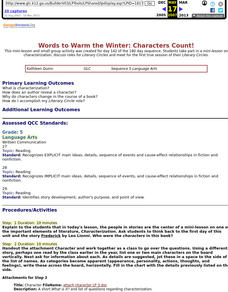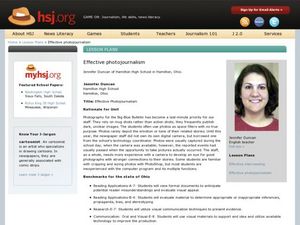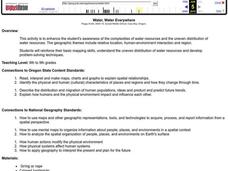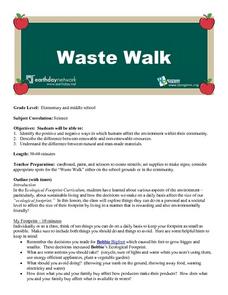Curated OER
The World Without Nouns
Young scholars study nouns. In this nouns lesson, students take pictures of themselves doing an activity. Young scholars use Adobe Photoshop to color a major noun in the picture. Students use Keynote or PowerPoint to create a slideshow...
Curated OER
Words to Warm the Winter: Characters Count!
Fifth graders take part in a mini-lesson on characterization, discuss roles for Literary Circles and meet for the first true session of their Literary Circles.
Curated OER
Effective Photojournalism
Learners determine what makes a quality photo and take and edit appropriate photos that relate to their assigned articles. They select good pictures for their publication.
Curated OER
"Subject" Matter in Art
Students are shown slides of artwork and are to give it a subject. To evaluate the students, they take a multiple choice, true-false, fill in the blank and matching test.
Curated OER
Planting A Garden On Campus
Students investigate the school campus area in order to plan the best spot for a class garden. They create a map of the school and research the different types of soil that exist in order to find the best spot. The class takes the...
Curated OER
Geography: Analyzing the Local Environment
Students, in groups, explore the school grounds and organize their findings according to the five themes of geography. They take notes and sketch the grounds. Students divide the school and grounds into regions based on use.
Curated OER
Water, Water Everywhere
Students are introduced to the complex issues of water resources around the globe. In groups, they take on the role of a country and map out the location of water sources. They barter, sell or take over other groups to have access to...
Curated OER
LIVING WITHOUT WASTE - USE OF TIME
Students investigate the concept of time and how it is used. There are key words that can be used to stimulate thinking about how each is related to time. They take an inventory of how time is spent in a single day. Then students can...
Curated OER
Care of the Environment
Students discuss human responsibility towards nature, read story The Man Who Planted Hope and Grew Happiness, take Close to Home quiz to measure their level of commitment to and concern for environment, and discuss ways to be more...
Curated OER
Materials 1: Materials and Manufacturing
Pupils examine the properties, limitations, and durability of a variety of materials, then evaluate which of the materials would be best for building a model house. If used in its entirety, this lesson could take several science class...
Curated OER
Fuel Cells
Young scholars examine how fuel cells and combustion engines work. Using the internet, they research the positives and negatives of the various energy sources. In groups, they complete an experiment with a working fuel cell model and...
Curated OER
Air: You Can't See It, But It's There!
First graders investigate that air occupies space by performing experiments that show this principle. Students are provided with a lunch bag. Students open the lunch bag and look inside. Students determine if there is anything in their...
Curated OER
Science: Vocabulary Memory Game
Fourth graders increase their comprehension of science terms by playing a vocabulary matching game. In small groups, they take turns trying to match vocabulary terms with the correct definitions. Missed words are added to the students'...
Curated OER
Environment: Waste Walk
Students assess the positive and negative affects of humans on the environment. The lesson explores ways in which individuals and societies can reduce the negative impact on the environment. By taking a "waste walk" around their campus,...
Curated OER
Behavior Code
Students develop codes to guide individual actions and responsibilities as members of the team. They explore memories, journal entries, etc. about
about teamwork. Through prompting questions, they translate these into a
draft behavior...
Curated OER
Shape Walk
Students take a field trip to a local park or beach to collect objects. They practice counting the objects and put them into categories according to type of shape like a cone, cylinder, etc... As an extension to the lesson students could...

















